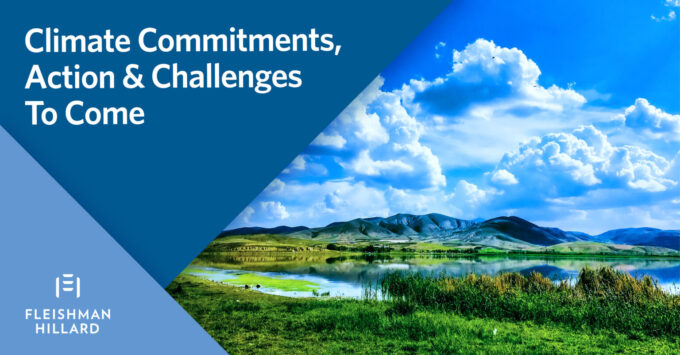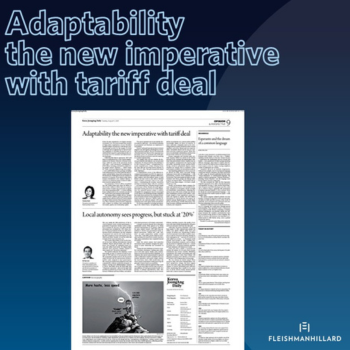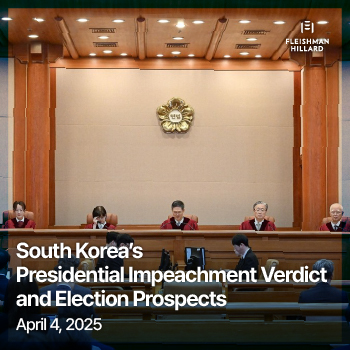December 20, 2023
By Michael Hartt, Maximo Miccinilli, Kathy Chung and Wang Yang
The 28th Conference of the Parties (COP28), hosted in Dubai from November 30 to December 13, 2023, marked a pivotal gathering of government leaders, multilateral organizations, scientific experts and corporate stakeholders, all driven by the urgency to address climate mitigation and adaptation. After two weeks of intense negotiations characterized at times by debate and division, nearly 200 Parties reached a new climate deal at COP28. The implications of this Global Stocktake – the midway point from the 2015 Paris Agreement to its 2030 targets – will be significant for companies addressing disparate legal and regulatory frameworks, managing political expectations, and communicating with stakeholders and the public about climate action.
Key takeaways from COP28 include:
1. Major Agreements and Commitments
- Agreeing the UAE Consensus: COP28 participants unanimously adopted the UAE Consensus, the new climate framework that outlines targets and actions to limit global temperature rise to 1.5°C and accelerate emissions reductions.
- Transitioning Away from Fossil Fuels: A highly debated issue revolved around the inclusion of a fossil fuel phase-out in the agreement. Ultimately, the decision was made to endorse a commitment to “transition away” from fossil fuels. While this marks the first use of the term “fossil fuel” in a COP agreement and is seen as a historic achievement in recognizing the role of fossil fuels in driving climate change, some scientists, climate advocates and government leaders deemed it unacceptable for not going all the way to a complete “phase out” of fossil fuels.
2. Energy Transition Pathways
- Renewable Energy Transition: COP28 witnessed several countries pledging to transition to renewable energy sources and phase out coal, complete with specific timelines and goals that mean tripling renewable deployment by 2030 under the Global Pledge on Renewables and Energy Efficiency. However, the final agreement recognized the role of “transitional fuels,” typically meaning gas, which burns cleaner than oil or coal. This was a significant win for the gas industry and prompted questions about the speed and scale of a transition away from natural gas and LNG.
- Tripling Nuclear Energy Capacity: One of the key developments at COP28 was the agreement by 22 countries, including the United States, France, Japan, South Korea, Sweden and the United Kingdom, to triple their nuclear energy capacity from 417 gigawatts in 2022 to over 900 gigawatts by 2050. This move recognizes the role of nuclear energy in achieving the 1.5C target for some countries, though nuclear continues to face resistance in countries like Germany. Under the pledge, countries will adopt several measures, including extending the life of existing nuclear reactors and build both new large-scale reactors and advanced small modular reactors (SMR).
3. Climate Finance Commitments
- Breakthrough on Loss and Damage Funding: After strong efforts by lower- and middle-income countries and vulnerable countries to build on promises at previous COPs, COP28 saw the major breakthrough: Large donations by the UAE, United States, United Kingdom, Germany and others to a loss and damage fund. This fund will provide support for unavoidable climate impacts, such as extreme weather events and rising seas – though skeptics assert it provides a small fraction of the amounts required to address needs.
4. Food Systems and Food Security Declaration
- Declaration on Food Systems: For the first time, COP attendees examined the connection between food systems and climate, from the relationship between current food demand and carbon emissions to the ways to improve food security amidst climate-driven extreme weather incidents and long-term weather changes. The Declaration on Sustainable Agriculture, Resilient Food Systems and Climate Action emphasizes resilience, food security and resource efficiency, with a special focus on water.
5. Policy and Regulatory Updates
- Carbon Pricing Initiatives: Several nations discussed plans to implement carbon pricing mechanisms and carbon trading systems, but debates around the creation of a supervisory body was not resolved and the permanence of carbon reductions and removals were not resolved. This leaves implementation of the Paris Agreement’s carbon trading provisions in an uncertain position at the halfway point to 2030.
- Stringent Emissions Reduction Targets: COP28 introduced new, more stringent emissions reduction targets for various sectors, signifying a need for potential adjustments in companies’ sustainability strategies. The Global Methane Pledge (GMP) is one of the most important examples by aiming to cut anthropogenic methane emissions by at least 30% by 2030 from 2020 levels. Another example is the global commitment, endorsed by the World Cement Association, to set intermediate targets to support a sustainable cement and concrete industry, encouraging technical development and innovation by its members to help achieve full decarbonization by 2050.
The wide range of topics addressed at COP28 will create expectations – and in some cases mandates – for businesses from a range of sectors to take greater and faster action. While media coverage focused on heavy emitting industries like energy, the impact of the renewable transition will be felt across supply chains. Businesses will need to review their targets and plans, particularly with countries required to submit updated climate plans in 2025 and the continued pressure for improvement by 2030.
The final COP28 agreement represents an unprecedented global consensus to transition away from fossil fuels, which have long been the primary driver of the climate crisis. This historic agreement, reached after 28 years of international climate negotiations, undoubtedly marks a significant step forward. However, it also prompted a sense of bittersweet victory, with some arguing that it falls short of the more decisive phase out of fossil fuels that many had hoped for.
With elections scheduled in over 70 countries in 2024, the political landscape remains dynamic and the fate of climate policies remains uncertain. Green initiatives have faced criticism over their cost and burden upon the public, with risk of being rolled back in several major economies. Simultaneously, the EU will push forward with its aggressive plans for carbon reduction – meaning companies will need to manage diverse political interests simultaneously.
COP28 serves as both a cause for celebration and a call to action. It highlights the progress made in recognizing the urgency of the climate crisis, but also the formidable challenges that persist in transitioning to a sustainable future. As organizations move forward, it is imperative that they remain committed to pushing for more ambitious climate goals and holding leaders accountable for their promises. The road ahead is long and challenging, but the stakes have never been higher, and the need for decisive action has never been more apparent.

Find Out More
-
Adaptability the new imperative with tariff deal
August 5, 2025


